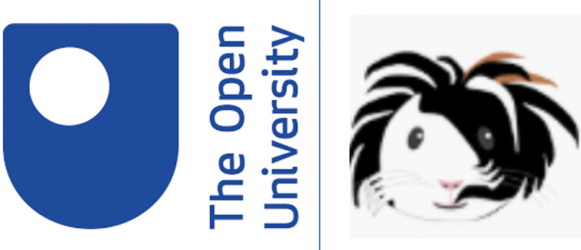“The impact of the pandemic on open schooling projects”
Alexandra Okada
Understanding the impact of the pandemic on open schooling projects is a key topic of the European online event using “fishbowl approach” organised today March 24th by OStogether a network with nine European projects – all part of the European Commission Horizon 2020 programme – Science with and for society. The moderator was Maria Zolotonosa (from Make it Open). There were four speakers who started the debate.
- Alexandra Okada (The OU, UK – CONNECT): How can we help schools to connect and cooperate with local communities during the COVID pandemic?
- Matteo Merzagora (Association TRACES, France – SALL) :the challenge of building trust at distance – difficulty of stakeholder engagement when actors do not know each other
- Nicole Salomon (OVOS media, Austria – COMnPlay): experience of organising a virtual makerspace
- Erik Knain (UNIVERSITETET I OSLO, Norway – SEAS): Open schooling can help teaching during a pandemic, but maybe not teachers
The rapid spread of the new COVID-19 variants has put the world on alert. The various school lockdowns have affected the educational system in our countries. Challenges and opportunities must be considered to better respond to these issues. How can our open schooling projects support schools during and post-pandemic? What can be done, and what can be done differently?
Open Schooling (OS) is a key approach promoted by the European Commission through nine funded projects to support the cooperation between schools, scientists and local communities for youth to become more engaged with science through real-world problems.
These OS projects have been developing a variety of relevant approaches to bridge formal, non-formal and informal science education to improve students’ experience in science. These approaches include a variety of relevant scenarios, themes, pedagogical methods, tools, environments and multi-actor platforms with high-quality resources, learning materials, and events, for example, workshops, courses, coaching and mentoring programmes.
A relevant issue suggested by a member of OStogether was
“How could we help schools connect and cooperate with local communities through open schooling in science during COVID-19?”
This question leads to many others.
Are schools interested in connecting with communities? What type of connections are they willing to establish? Will they benefit from cooperating with external partners? What are the advantages of cooperation for schools and partners involved in open schooling?
To respond to these issues, more questions are necessary.
What are participants’ needs (what they CARE)? What are their priorities (what they wish to KNOW)? What are their expectations (what they can DO) during and post-pandemic?
CONNECT is an open schooling project with 10 partners led by the AI enterprise EXUS responsible for project coordination and technology and the Open University responsible for scientific coordination, ethics and evaluation.
Our aim is to increase students’ confidence towards using science in life now and future by connecting them with science professionals, family, and community members.
CONNECT is designed to facilitate teachers’ work through the curriculum enhanced by multi actors’ cooperation. Our open schooling model focuses on socio-scientific issues and societal challenges that:
- activate students and their local communities interests, concerns, “CARE”,
- create the need to KNOW linked to the curriculum supported by teachers and,
- offer opportunities for students to DO science-actions and develop skills guided by scientists and STEM professionals.
To facilitate connections and cooperation, schools are provided with future-oriented support by scientists, engaging activities, fun participatory science tools, and more inclusive teaching strategies with special attention to disadvantaged students, gender equality, and educational equity.
Pandemic has affected significantly the education system. Schools and universities had to move to distance education during various lockdowns. Many teachers and students were not prepared nor equipped to work with technology. A large number of disadvantaged students of state schools with free meals missed social relationships, learning, and food.
UNESCO (2021) has been calling our attention to the human capital loss during COVID-19.
“Approximately half of the world’s population (some 3.6 billion people) still lack an internet connection… 463 million or nearly one-third of students around the globe cannot access remote learning. The pandemic shows that connectivity has become a key factor to guarantee the right to education. Digital skills and learning must be incorporated into education systems in order address the injustice of the digital divide”
The context that we have now with COVID-19, school lockdowns and self-isolation, is completely different from when we develop our open schooling proposals. To identify the needs, priorities, and expectations the OU team developed three studies with students, open education researchers, and teachers during the pandemic .
First study examined students’ views of an introductory module of the Open University (Okada & Sheehy, 2020). We contacted 4,500 students, and 550 participated in our exploratory study about online learning during the first lockdown in the UK. Our aim was to understand their views about collaborative learning, cooperation with others, problem-solving and inquiry based-learning, traditional teaching approaches, and the value of fun/enjoyment in distance education. The OU is the largest university in the UK open to all learners with a significant number of disadvantaged students, 72% work full or p-time, 26% live in the 25% most from deprived areas, 34% of new students come from secondary schools or failed to complete it and 33% with a lower qualification at entry. (OU, Facts, and Figures)
Our findings revealed that more than 85% of students valued fun in learning to support well-being, motivation, and performance. However, approximately 15% indicated that fun within learning could result in distraction or loss of time. Three groups were identified (1) students who value fun in collaborative learning wish more interacting activities and cooperating with others, (2) students who think that fun gets on the way of their individual learning prefer to learn on their own pace and on their own with useful activities problem solving and inquiry-based activities to succeed in their exams, (3) students who mentioned that there is no fun in online learning think that online learning is transmissive – focused on content, they do not want to waste time with discussions, teamwork, and participatory approaches. There are also students who cannot see the point of cooperation, fun and engagement. They are struggling to study, feeling depressed, or stressed, they mentioned that are not capable nor ready to engage with collaborative projects
Second study, focused on a workshop organised at the OEGLOBAL conference with 700 attendees, 277 presentations with 12 studies about open education and COVID-19 pandemic. We investigated the key issues for the open education – open schooling including learners’ competencies, learning environments, open partnerships, and education 2030 with SDGs. In this workshop we also discussed the recent reports of UNESCO, World Bank, and OECD about Education and COVID – technologies,.
Four key topics emerged in our discussions – a significant loss of human capital: 1. learning disruption including low achievement and high dropout rates; 2. students’ health (mental, physical, and emotional); 3. teachers’ workload (pressure and stress) and 4. Inequalities (increased gap of disadvantaged students).
Participants highlighted eight key drivers: education for all, special attention for girls, affordability, free education, pedagogy, new education policy, each one – teach one, the added value of open school/ open education. Fifteen recommendations were grouped to enhance open education to support learners’ access, learners’ retention, learners’ attainment, and learners’ progress.
Third, in terms of “DO”, we are investigating the context, expectations and science-actions needed to be developed by large communities of teachers from Amazon, Pantanal and large semi-arid area of Brazil. This study will be completed for a book related to Adversities in Education….
While all eyes are on COVID-19, both the Amazon forest and the world’s largest tropical wetlands Pantanal face fire… Conservation and environmental protection are in crisis
BBC (Nov. 2020) Highlighted that “The number of fires blazing in Brazil’s Amazon region in October 2020 was more than double those in the same month last year, satellite data suggests. The Institute of Space Research said there were 17,326 fires in the Amazon, compared to 7,855 in October 2019. Data released by INPE suggests there were 2,856 fires in the Pantanal region in October.
Our study reached more than 7,000 teachers from these areas. More than 1,000 teachers completed our questionnaires, participated in our webinar, discussed their issues, practices, needs, and expectations related to open schooling through webinars, questionnaires and interviews. We are now discussing what type of connections and kinds of cooperation are relevant for state schools and communities considering not only the effects of the pandemic, digital divide but also environmental socio-scientific, and political issues. This study is in development for the book Adversities in Education edited by Dr. Holliman and Prof. Sheehy.
To sum up, CONNECT project was designed before the pandemic and started during the peak of COVID-19. Understanding the stakeholders’ needs and more inclusive and future-oriented strategies are fundamental especially in the UK, Brazil, Spain/Catalunya, Greece, and Romania. Eva Jaho – project coordinator from EXUS is developing a detailed risk analysis. Some consortium members, who have been interacting with their schools’ network that faced various lockdowns, highlighted a few barriers indicated by teaching staff:
- More emphasis on completing the curriculum and fewer opportunities for external activities,
- More teaching time needed and less time for learners’ centered approaches
- More emphasis on preparing students for exams and less time for inquiry-based learning and community-based projects
- More concerns with students achievement – knowledge acquisition (short term) rather than scientific skills development (long term)
- More resources and support online but limited opportunities for the most needed students, who do not have access to the internet nor digital devices.
They also mentioned some opportunities. There will be more schools looking for:
- More high quality learning resources linked to the curriculum
- More enjoyable activities – fun and relevant – that are meaningful for students’ learning
- More opportunities to help students become more confident, more interested in and more capable to succeed in science.
- More strategies to deal with outbreaks and foster scientific and digital literacy
- More support through cooperations to help the large number of disadvantaged students, educating girls and and the various minorities groups.
To open up further discussions,
our preliminary findings suggest that there will plenty of relevant societal issues for developing useful open schooling projects. There will be some meaningful practices to evaluate the value of open schooling approaches/ models in-depth. However, …
…will there be opportunities to scale up our open schooling models before the end of our projects and keep it sustainable after it? How?
Questions discussed during the event:
- What are the challenges for open schooling? How have these challenges changed with the pandemic?
- How can we engage parents/families in your open schooling projects, given that their role changed a lot during the pandemic?
- How can we best support teachers? And the rest of stakeholders including Policy-makers?
- How do we find the balance between being on time with your open schooling projects (in terms of following the Grant Agreement) and not pushing schools too much?
- Have we made any big adjustments to our projects due to the pandemic?
- How can we convinced schools to stay on board when things get tough?

